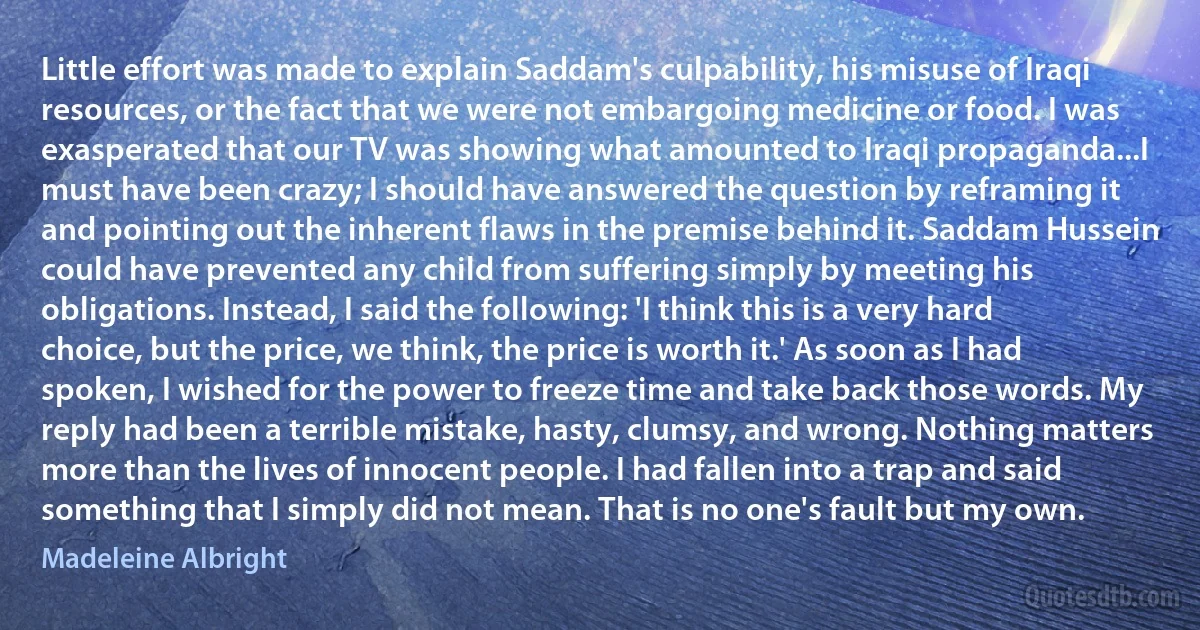
Little effort was made to explain Saddam's culpability, his misuse of Iraqi resources, or the fact that we were not embargoing medicine or food. I was exasperated that our TV was showing what amounted to Iraqi propaganda...I must have been crazy; I should have answered the question by reframing it and pointing out the inherent flaws in the premise behind it. Saddam Hussein could have prevented any child from suffering simply by meeting his obligations. Instead, I said the following: 'I think this is a very hard choice, but the price, we think, the price is worth it.' As soon as I had spoken, I wished for the power to freeze time and take back those words. My reply had been a terrible mistake, hasty, clumsy, and wrong. Nothing matters more than the lives of innocent people. I had fallen into a trap and said something that I simply did not mean. That is no one's fault but my own.
Madeleine AlbrightRelated topics
behind child choice crazy culpability effort fallen fault following food hard hasty innocent lives mean medicine mistake misuse nothing people power premise price propaganda question reply say should showing something speak suffering take think time trap worth wrong words iraqi saddamRelated quotes
In Sudan, Bin Laden decided to acquire and, when possible, use chemical, biological, radiological and nuclear (CBRN) weapons against Islam's enemies. Bin Laden's first moves in this direction were made in cooperation with NIF [Sudan's National Islamic Front], Iraq's intelligence service and Iraqi CBRN scientists and technicians. He made contact with Baghdad with its intelligence officers in Sudan and by a [Hassan] Turabi-brokered June-1994 visit by Iraq's then-intelligence chief Faruq al-Hijazi; according to Milan's Corriere della Sera, Saddam, in 1994, made Hijazi responsible for "nurturing Iraq's ties to [Islamic] fundamentalist warriors. Turabi had plans to formulate a "common strategy" with bin Laden and Iraq for subverting pro-U.S. Arab regimes, but the meeting was a get-acquainted session where Hijazi and bin Laden developed a good rapport that would "flourish" in the late 1990s.

Michael Scheuer
I always say-a prejudice on my part, I'm sure-you can tell a lot about a person's character from his choice of sofa. Sofas constitute a realm inviolate unto themselves. This, however, is something that only those who have grown up sitting on good sofas will appreciate. It's like growing up reading good books or listening to good music. One good sofa breeds another good sofa; one bad sofa breeds another bad sofa. That's how it goes. There are people who drive luxury cars, but have only second- or third-rate sofas in their homes. I put little trust in such people. An expensive automobile may well be worth its price, but it's only an expensive automobile. If you have the money, you can buy it, anyone can buy it. Procuring a good sofa, on the other hand, requires style and experience and philosophy. It takes money, yes, but you also need a vision of the superior sofa. That sofa among sofas.

Haruki Murakami
Some scoffers have asked, "Where are the pre-Flood civilizations? If there was an entire civilization that was destroyed in the Flood of Noah, why don't we find their cities, highways or machines as we dig in the earth?” That's a fair question, but it is based on a false premise. What type of stuff would they need in a perfect world? If the weather was perfect and the animals were friendly and food was abundant and free and everyone was vegetarian, what would they need? They wouldn't need houses to be protected from weather, climate, or animals. I don't see why they would need buildings of any kind! If the earth was producing enormous quantities of food from pole to pole, they wouldn't need tractors, plows nor a highway system, nor vehicles to move food and goods from one region to another. They wouldn't need lots of things we need for survival and protection today.

Kent Hovind
On May 19, 2009, I was taken to the White House to meet President Obama. We'd met once before when he'd visited the Pentagon during his first week in office, but as DJS I'd been in a collection of other civilian and military leaders, so it was unlikely he remembered the man who would soon command his military effort in Afghanistan. I'd been in the Oval Office before with President George W. Bush, but the atmosphere in the West Wing in the final and opening months of administrations differed perceptibly. Although it was four months into Obama's term, there was still a feeling of newness to the people, who moved with an air of excited purpose through the hallways. When the president was available, the door opened and Obama walked to the entrance to greet me into the room. The meeting was short, but cordial. The president offered no specific guidance but locked his eyes with mine and thanked me for accepting the responsibility.

Stanley A. McChrystal
This Prime Minister must be drummed from office and we will use each and every opportunity to make that a reality...But this Prime Minister deserves to be impeached - and we, with others, will present the case that he should be required to answer...I believe that this Prime Minister now operates outside the currency of debate, beyond the pale of decency...I don't just challenge the policies of Tony Blair, I challenge his morality...This is not a question of this Prime Minister - any prime minister - making a judgement call and just being wrong. It is not a matter, as Blair would have us believe, of someone acting in good faith and making an honest mistake. This is a man who buried the intelligence that was inconvenient, manipulated the information to suit his purpose, and entered into a secret pact with the American President to go to war come what may.

Alex Salmond
